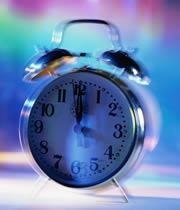Observing biological clocks reveals that not all of them are set according to daylight
Laura Nelson, Nature

Direct link to this page:
https://www.hayadan.org.il/bioclock0504.html
Researchers from the United States have shown that our brains contain more than one biological clock. They believe that problems such as jet lag are caused by a lack of coordination between the clocks.
Scientists have known for a long time that the mammalian brain contains one master clock, called the superachiasmatic nucleus. It consists of thousands of clock cells, which act as pacemakers for the rest of the body. Their gene activity pattern is a 24-hour cycle, but no one knew how these cells were organized.
To answer this question, neuroscientist Horacio Della Iglesia of the University of Washington in Seattle and his colleagues changed the normal 24-hour cycle of light and dark in rats to a 22-hour cycle. Then we examined the patterns of gene activity in the cells in the rats' brains.
Interestingly, gene activity in some cells shifted to the new 22-hour cycle, while other cells stuck to the previous twenty-four-hour cycle.
This raises the possibility of the existence of at least two separate clocks in the brain, Della Iglesia says. One of them is sensitive to changes in lighting, while the other is not. The study, published in the journal Current Biology, is the first indication that the clock contains groups of cells that are sensitive to different factors.
Although the researchers used rats, they believe that the findings are also true for humans. Under normal conditions, the two clocks are synchronized with each other and tell the rest of the body when to perform certain actions, such as preparing the stomach for a meal or when to make us feel sleepy.
When the light-dark cycle is disrupted, for example after flying to a different time zone, the clocks are no longer synchronized, Della Iglesia says. A situation can happen, in which the body is ready for action, all loaded with hormones for stressful situations, while the cycle of wakefulness and sleep is still in the sleep state.
"This may explain the lack of alertness that we experience during jet lag," says Della Iglesia. Only after a few days the two clocks will be coordinated again.
However, researchers still don't know much. Although one of the clocks is found to be sensitive to light signals from the grunt, they have no idea what the other clock is responding to.
Also, the signals coming from the brain to the other organs of the body, which have their own time cells, are also a mystery. "We have no idea what connects all these clocks," says Russell Foster, a neuroscientist at Imperial College London.
Translation: Dikla Oren
The article in Nature
The brain savant
https://www.hayadan.org.il/BuildaGate4/general2/data_card.php?Cat=~~~836804993~~~195&SiteName=hayadan

One response
I have a belief that one of the clocks is sensitive to noise. I don't know about the others, but I'm very sensitive to noise in my environment - during the day I'm used to hearing birds chirping and cars driving and people talking, and at night I'm used to hearing silence and maybe a car passing here and there. If in the morning it's too quiet or at night I hear birds, it will freak me out and I won't be able to sleep.